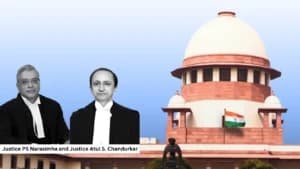In a significant ruling, the Supreme Court has held that once a sale deed is registered, it serves as a public notice, triggering the limitation period for any related claims. The Court overturned the High Court’s decision, which had earlier upheld a decree in a partition suit filed a staggering 45 years after the sale deed’s registration.
The ruling came in the case of Smt. Uma Devi & Ors. vs. Sri Anand Kumar & Ors., where the apex court reinforced the principle that the limitation period begins from the date of registration of a sale deed. The decision effectively barred the plaintiffs from pursuing partition claims after decades of inaction.
Citing the precedent set in Suraj Lamp Industries Pvt. Ltd. v. State of Haryana & Anr. [(2012) 1 SCC 656], the Court reaffirmed that the registration of a sale deed serves as a public notice. According to Article 65 of the Limitation Act, 1963, a suit for partition must be filed within 12 years, failing which it becomes legally untenable.
Read Also:- Supreme Court Judges to Publicly Disclose Their Assets
The Court also referred to Shri Mukund Bhavan Trust & Ors. v. Shrimant Chhatrapati Udayan Raje Pratapsinh Maharaj Bhonsle & Anr., emphasizing that once a sale deed is registered, it is presumed that the interested parties are aware of it.
Legal Basis: Transfer of Property Act, 1882
The ruling was reinforced by Section 3 of the Transfer of Property Act, which states:
“Where any transaction relating to immovable property is required by law to be and has been effected by a registered instrument, any person acquiring such property or any part of, or share or interest in such property shall be deemed to have notice of such instrument as from the date of registration.”
Applying this legal principle, the Court held that the plaintiffs were presumed to have knowledge of the sale deed executed by their aunt in 1978.
The case involved an ancestral property in Bengaluru, which had allegedly been partitioned orally in 1968. The sale deeds in question were registered in 1978, but the plaintiffs filed a suit for partition only in 2023—55 years after the alleged partition and 45 years after the sale deeds were executed.
Read Also:- CCTV Footage Reveals Police Assault: Calcutta High Court Warns of Harsh Action
Key observations by the Supreme Court:
“Applying this settled principle of law, it can safely be assumed that the predecessors of the plaintiffs had notice of the registered sale deeds executed in 1978, flowing from the partition that took place in 1968. The plaintiffs cannot reignite their rights after sleeping on them for 45 years.”
The bench, comprising Justice Sudhanshu Dhulia and Justice K Vinod Chandran, dismissed the claim, citing that the trial court was correct in rejecting the suit under Order 7 Rule 11 of the Civil Procedure Code (CPC) for being time-barred.
Trial Court Decision: The trial court dismissed the suit, deeming it time-barred under Order 7 Rule 11 CPC.
High Court Decision: The High Court overturned the trial court’s ruling, remanding the matter for reconsideration, noting that a “triable issue” existed.
Supreme Court Decision: The Supreme Court set aside the High Court’s decision, reinstating the trial court’s ruling and dismissing the suit.
Read Also:- 'No Coercive Steps': Telangana HC Halts Tree Felling Near Hyderabad Central University Till Thursday
In the judgment authored by Justice Dhulia, the Court underscored:
“In our considered opinion, the Trial Court had rightly allowed the application of the defendants/appellants under Order 7 Rule 11 CPC, holding that the suit filed by the plaintiffs was a meaningless litigation, that it did not disclose a proper cause of action and was barred by limitation. There were thus no justifiable reasons for the appellate court to have remanded the matter to the Trial Court.”
The Court also referred to Dahiben v. Arvindbhai Kalyanji Bhanusali [(2020) 7 SCC 366], where it was held that courts must prevent “sham litigation” when no valid cause of action exists.
“The underlying object of Order VII Rule 11 (a) is that if in a suit, no cause of action is disclosed, or the suit is barred by limitation under Rule 11 (d), the Court would not permit the plaintiff to unnecessarily protract the proceedings. It would be necessary to put an end to such sham litigation, so that further judicial time is not wasted.”
Case Title: SMT. UMA DEVI AND ORS. VERSUS SRI. ANAND KUMAR AND ORS.
Appearance:
For Petitioner(s) Mr. C.A. Sundaram, Sr. Adv. Mr. Abhishek Gupta, AOR Ms. Roshini Musa, Adv. Mr. Dashrath T.m, Adv. Mr. Zafar Inayat, Adv. Mr. Praful Shukla, Adv. Mr. Nikhil Kumar Singh, Adv. Mr. Shailesh Madiyal, Sr. Adv. Mr. Sudhanshu Prakash, AOR Ms. Anisha Agarwal, Adv. Ms. Divija Mahajan, Adv. Mr. Kanishk Sinha, Adv.
For Respondent(s) Ms. Akhila Wali, Adv. Mr. Nanda Kumar K B, Adv. Mr. Abhishekh Singh, Adv. Ms. Sunayna Agarwal, Adv. Mr. Santhosh N, Adv. M/S. Nuli & Nuli, AOR Mr. Saket Gogia, Adv. Ms. Gauri Pande, Adv. 2 Ms. Sheetal Maggon, Adv. Mr. Mansingh, Adv. Mr. Dhawesh Pahuja, AOR Mrs. Vandana Gupta, Adv. Mr. Rahul Gupta, AOR














